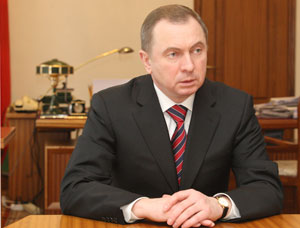
Belarus: Western Universalism and Human Rights
Publication: Eurasia Daily Monitor Volume: 10 Issue: 131
By:

After two heated discussions at the European Parliament’s (EP) Foreign Affairs Committee, Justas Paleckis, EP rapporteur on Belarus, modified his draft report (see EDM, June 14). The statement that in 2012 the human rights situation in Belarus improved was deleted. The situation is now described as grave, and the decline in the number of politically motivated court verdicts is attributed to the atmosphere of fear created by the regime. Paleckis, nevertheless, maintains that his colleagues endorsed the main idea of his draft report: The European Union should not abandon Belarus. He also maintains that his appeal to suspend travel sanctions imposed on the members of Belarus’s political regime applied only to Foreign Minister Vladimir Makei (www.gazetaby.com/cont/art.php?sn_nid=58588?).
Makei, who has indeed been deleted from the EU’s visa ban list, has published an extensive article titled “Human Rights: What and Who Made Them Divide the World?” (https://eng.globalaffairs.ru/number/Human-Rights-What-and-Who-Made-Them-Divide-the-World-16031). The article claims that human rights debates increasingly make it clear that it is impossible to change attitudes rooted in centuries-old specific cultural, religious and other underpinnings. Makei views such peculiarities of Russia’s development as the Mongol invasion of the 13th and 14th centuries and the Time of Troubles in the early 15th century as leading to a high level of centralization and to an emphasis on a larger community, not on individual rights. These social results were “replicated in some territories that came under Russia’s control or influence in later periods.” The United States followed in Europe’s footsteps, but early on, US foreign policy was guided more by pragmatism than by idealism. This attitude, according to Makei, was best reflected by US President John Quincy Adams who, as Secretary of State in 1821, proclaimed that “she [America] goes not abroad in search of monsters to destroy.” But the growth of US power begot messianism of those who believed in the country’s divine anointment to look everywhere for new monsters to destroy. According to Makei, however, the issue of human rights must not be as divisive as it is, “if only we begin to genuinely appreciate each other’s specific historical courses and treat each other accordingly.”
Makei’s thesis fits Samuel Huntington’s dictum that “Western belief in the universality of Western culture suffers three problems: it is false; it is immoral; and it is dangerous… Imperialism is the necessary logical consequence of universalism” (Samuel Huntington, Clash of Civilizations, 1996, p. 310). This view, however, is not popular in the West. Out of two assertions—1) Shaped by history, society is path-dependent and generates demand for certain rulers and 2) Domestic politics of the powers that be lead to social results such as mores, attitudes, national identity, etc.—the second one gained more acceptance in part due to the efforts of the well-funded human rights community.
Recent (March and June) national polls by the Independent Institute for Socio-Economic and Political Studies (IISEPS), a Belarusian entity funded by the West, provide information for an ongoing if latent clash between the aforementioned standpoints (Generalized results of these polls are available at https://www.iiseps.org/ and https://iiseps.org/old/). On the one hand, a relatively high and rising rating of Belarus’s head of state (see EDM, July 11) is, according to the pollsters themselves, a “direct result of a lack of electoral alternatives amplified by the power of state propaganda.” To this effect, the sociologists quote the stand-up comedian Mikhail Zhvanetsky: “If my room has only one window, what would its rating be?” (https://www.iiseps.org/analitica/551). On the other hand, when asked which measures can ensure the successful modernization of Belarus, only 18 percent of the respondents point to strengthening democracy, while most point to technological aspects of modernization. Also, when asked, what is more important, improvement of the economy or the country’s independence (a quintessentially Belarusian question never posed in countries with a strong national identity), only 29.3 percent point to independence and for 65.1 percent the improvement of the economy is more important.
IISEPS is disliked by both the government and the opposition. “In a society split between the proponents and detractors of an authoritarian father figure, who is going to believe in his rating as determined by a survey!” write the pollsters (https://www.iiseps.org/analitica/551). “To Batska’s [“father”—a nickname ascribed to Belarusian President Alyaksandr Lukashenka] supporters, his rating always looks too low (For what can one expect from sociologists serving Western handlers?) [sic],” the IISEPS analysts write, continuing, “To [Lukashenka’s] detractors, however, his rating is unbelievably high (For what can one expect from KGB agents, and how can one measure anybody’s rating under an authoritarian rule?) [sic].”
Nonetheless, almost anybody can find something to his or her liking in the IISEPS survey results. For example, those who believe that Belarus’s dependency on Russia is overpowering point to the fact that 36.8 percent of Belarusians from 30 to 59 years of age do not like the prospect of a Russian airbase locating in Belarus. At the same time, however, 35.7 percent are indifferent, and 18.8 percent are in favor of this prospect. Younger people do not display an attitude any more hostile to the proposed Russian airbase than those between 30 and 59.
Indeed, in response to Lukashenka’s statement that “Russians and Belarusians are a single whole,” 54.8 percent agreed and 31.0 percent disagreed. Also, 57.5 percent use only Russian in everyday communication and 3.3 percent use only Belarusian; “Trasianka” (a mixed Russian-Belarusian dialect) is used by 22.9 percent; and 15.9 percent said they use Russian and Belarusian intermittently.
Importantly, 43.6 percent of respondents identify with the statement that “the state has to ensure a certain minimum of consumption for everybody, and if one wants more, one should achieve that on his/her own.” Further, 35 percent believe that “the state has to ensure full equality of all citizens, not only in legal and political areas but also in the area of possession of property.” A strong paternalist streak shows through these statements.
All in all, Western universalism is not easy to endorse on the basis of public opinion polls conducted in Belarus. Still, it remains an article of faith. Here, the following saying, often attributed to writer Anais Nin, comes in handy—“We do not see things as they are, we see things as we are.”




